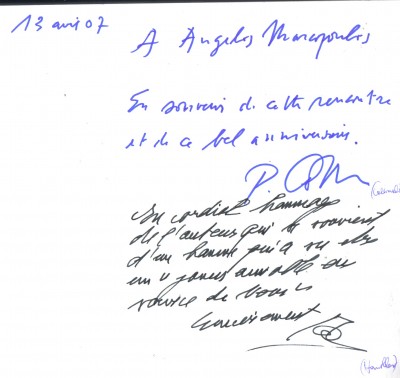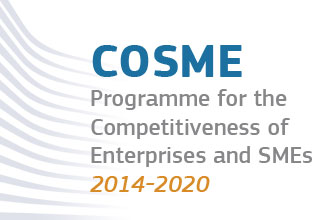 newsitems
newsitems  ERC Head Bourguignon to EF on Scientific Research Impact to Society, key of EU Funds Future Strategy
ERC Head Bourguignon to EF on Scientific Research Impact to Society, key of EU Funds Future Strategy
ERC Head Bourguignon to EF on Scientific Research Impact to Society, key of EU Funds Future Strategy
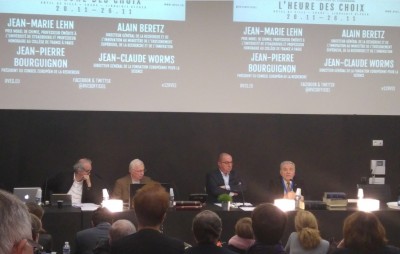
-
*Strasbourg/European RDV 2017/Angelo Marcopolo/- While EU Political Leaders nowadays Prepare a New Multi-Annual Program for EU Funds to Scientific/Technological Research in the Post-2020 Future of Europe, the President of the European Research Council (ERC), Professor Jean-Pierre Bourguignon, Replying to "Eurofora"s Questions, (for Other Replies of ERC's Head to our Quesiions at a Previous Press-point, See: http://www.eurofora.net/newsflashes/news/ecrheadoninternationalrelations.html) acknowledged the Growing Importance of the competing projects' "Impact" on Society, where Public Debates with EU Citizens' involvement, Before crucial Decisions affecting their Lives and/or Society at large, are a Must, according to EU Council's current Strategy, (which Surprisingly approaches "Eurofora"s Wider Project, in a Key area).
Indeed, EU Council is due to decide, Next Week in Brussels, on an "Interim Evaluation of (EU Research Funding pre-existing Program) Horizon 2020", and the New, "9th Framework Programne", starting from 2021. And, already on May 2015, the EU Council has urged, to "Assess" the Funded Projects, by putting "Emphasis" also "on their ... Impact".
-------------------------- -
"Eurofora" refered to mentions made on the "Impact" of Scientific Research, as well as to the European "Synergy" Program (See Infra) with PluriDisciplinary Cooperation among Human/Social and Natural Sciences, in order to raise a Classic, but also Topical and Political Question :
- "Why some (even among the Best Researchers) might eventualy look a bit Reluctant vis a vis the Clarification and Valorisation of the Social Issues at Stake in Scientific Research ?".
- However, "their Interest for the Society, which could, sometimes, even make People Dream with Science, and Strengthen it Politically, while being also a Responsibility, given that Public Funds are spend for it, but often even a Pleasure and an Opportunity, for real Intellectuals, to develop a Profound Thinking on the real Meaning that has for the Society what they are doing, and the Choices that they are making", we observed, in this regard.
=> "Instead of some Reluctances, on the Contrary, don't you think that it would be Useful to Develop Further the Clarification of what is really at Stake in Scientific Projects, in the Choices made by Scientific/Technological Research, their Potential Interest on what we could Hope to Achieve, presenting an Horizon, interesting also for the Future of Europe, which another Topical Question", Eurofora wondered.
-----------------------
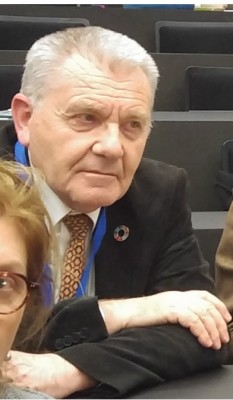
- "I'd prefer to speak about the issue of the "Impact" of Scientific/Technological Research, "because I am concerned, also since I'm Often Incited to Address that "Hot" Issue, several Times, including in Public, even by State Secretaries, Ministers, etc., so that" it cannot be ignored at all, started to Reply to "Eurofora"s Question ERC's President, Professor Jean-Pierre Bourguignon.
- "The main Reply" to this Question, basically "is always the same : Certainly the Impact (of Science/Technology) is Interesting for us", he clearly Confirmed.
- "But, that does not mean that it should also be a determinant factor, a necessary Criterium for the Choices due to be made between various (Scientific/Technologic Research) Projects" to Fund, or not, he went on to add, (obviously defending the Autonomy and Freedom of Science, at least in Principle).
- "So that, for us (ERC), for example, "it's Out of Question to Choose (among various Projects) Exclusively on the Unique Basis of the Impact, particularly the Economic (Financial) Impact only", he Warned Carefully, (while also making things Clear on which Concrete points, some among the main Objections are Focusing, among the Scientific Community).
- However, "we Must, certainly, Develop further the Visibility of what is the Outcome of the Projects", the Experienced ERC's President stressed, as far as the above-mentioned "Eurofora"s Question was concerned.
- "And that's one of the Reasons for which I find that ECR's Administrative Budget, used in order to Make an Analysis of the Impact of Projects, Needs to be Enlarged", he advised, given the growing Importance of that aspect, (See Infra).
- "Because, it's absolutely Legitimate (but often, not so Simple) to Explain what could be the Real Results of the Projects", President Bourguignon pointed out.
+ By the way, "concerning Human and Social Sciences", (i.e., which can, precisely, be used also in order to examine the Socio-Economic a.o. Impact of Projects, even of Natural Sciences, as "Eurofora" had highlighted: Comp. Supra), "the Rules applied by the ECR are very Simple : There is Strictly an Autonomy: We let Receive what the Researchers present to us".
- "And, from this point of view, the Budget spend during the Last Year for Human and Social Sciences is quite considerable : It's about 400 Millions €, i.e. a very Significant Amount of Money", he observed.
- "It concerns almost All the Domains of Human/Social Sciences, and, particularly, something which is not generally well known, is that, in fact, the Researhers are very Keen into chosing Important and Topical Issues", (i.e. avec a Serious Potential Impact in Nowadays Society) :
- "F.ex., when we (ECR) examined the series of Projects concerning Migration, during the last years, we saw that there was a absolutely Remarkable Augmentation of the Number of Projects", in this area, "and simply at the Initiative of Researchers themselves", he pointed out.
- Indeed, "they found that this was an Issue on which it was Necessary, Nowadays, to dedicate More Research, Serious and Rock-Solid Studies".
- "This goes almost for All Issues of Topical Importance, as, f.ex., also on Energy, where the ECR has, now, in its Files, almost 300 Projects on Energy, and about 600 Millions € spending on Energy Issues", he revealed.
- "So that, when we spoke, recently, about that, with the EU Commission's vice-President responsible for Energy, Mario Sefcovic, he was Astonished to find out that there is So Much Research on Energy"...
- "Simply, the Researchers are spontaneously Interested, by themselves, on what is More Important", nowadays, "so that there is No Need to push them for that", he found.
- "It doesn't mean that there might not be, in addition, a Need for some More Focused Programs", ECR's Head admitted.
- "But I think that (European) Researchers are doing so, in Their own Way, and with Their Agenda", he Concluded on this point, optimistically.
--------------------------------------------------
EU's EVOLVING PRINCIPLES :
----------------------------------------------------
On this regard, more Recently, a July 2017 relevant Opinion of the ERAC, "requires that the (Science and Technology Research Programmes, "Should Contribute to Other (EU) Sectoral Policies, and Promote Better and Continued Dialogue with European Citizens".
And a subsequent, "Tallin Call for Action", on the Results of a Conference organized by the Estonian EU Presidency, on October 2017, launched a Call to "Increase the Impact of Research and Innovation Investments, and Buid Trust between Research and Society" (See also Infra).
Comming also After EU27 Heads of States/Governments' Summit's "Rome Declaration", last March 2017, in Italy, (which Marks a Change in overall EU Policies, for a Future of Europe closer to EU Citizens, (See Relevant "Eurofora"s NewsReports from Rome, f.ex.: .... + ...), a Draft Decision on EU Research Programs, due to be Examined and Endorsed Next Week in Brussels, Significantly Adds to "Economic Growth" and "Industrial Competitiveness", also "Social Inclusion and Addressing Major Societal Challenges", i.e. "Wider Societal Issues".
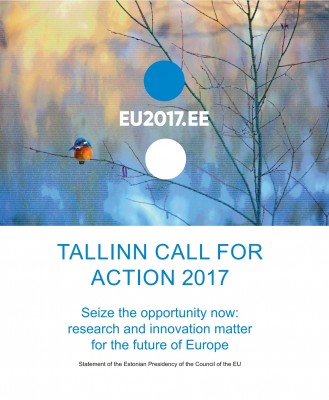
More Important: The above-mentioned Estonian EU Presidency's Official "Statement" on "Research and Innovation matter for the Future of Europe", made on October 2017 in Tallin, (Comp. Supra), also Known as "Tallin Call for Action", "presented to Stakeholder Representatives at a High-Level Conference on "European Research Excellence : Impact and Value for Society", which came Timely during the Preparations of the Forchcoming EU Heads of State/Government Summit in Brussels, 14-15 December 2017, "has been Drawn up in Close Cooperation with EU Stakeholdrs, via On-Line (Web) Consultation and RoundTable Discussions", in the wider Context of "the current Debate on the Future of Europe".
- "The overall Impact and Value of Research and Innovation is much Wider" (than its mere Economic Benefit), "Bringing Long-Term and Transformative Benefits to Society, most notably through Educated and Competent People, and Improvementrs to our Everyday Life". It "Gives us a real Chance to Build Better Future", and "we Need Research to Deepen our Understanding of our Changing Societies", it Observes.
>>> - That's why, "there is a Need to Act Urgently ... to ensure Broad Political Commitment for Increasing Research and Innovation Funding, Impact of these Investments, and Public Trust", it stresses from the outset. For that Purpose, "Stronger efforts are needed to Make the Benefits of R&I Visible and Understandable by all, and to achieve Wide Citizen Involvement, ...as well as Engaging People" (i.e. "Both with Stakeholders and the Public"), not only "to Explain our Needs", but also "in Shaping our Common Future".
>>> Indeed, "Increase the IMPACT of R&I Investments", and "Build TRUST between Research and Society", are set as 2 out of 3 "Priorities", (another one concerning the "Investments" themselves).
- This implies to "Recognize a Broad Notion of Impact", including "the Societal Value of Research", and a "Dynamic Approach to Impact Assessment", through a "Necessary Cultural Change", EU Presidency urged :
=> In particular, the relevant "Decision-Making" must become "More Transparent", "Consider Potential Applications and Societal Impact" of Research, "Clarify and facilitate Understanding of the Issues", and "Communicate the Impact and Results of (R&I) Work", by "Inform(ing) Public Debate" and "Develop(ing) Dialogues with the Public", (i.e., a Move Strikingly Near "Eurofora"s wider project !)...
+Naturally it also Includes, eventually, a "Constructive Criticism", and possible "Limitations of Scientific Research", EU Presidency's Text adds.
>>> The Main point being, for all Scientific/Technological "Researchers, Research Organisations, Research Funders", to "Engage the Public", and particularly "the People", at "All Levels of Government", "with Research that Affects them", "in the Co-Creation of the Future", looking for "Possibilities to Co-Design and Co-Implement Solutions to Societal Changes, based on Science and Innovation", while Also "Explaining the Work you do", and "Following ... the Principles of Integrity and Good Research practices".
(I.e. strikingly Similar to the "Good Administration" Legal Principle, for Public Authorities' Decisions affecting EU Citizens, according to EU's Lisbon Treaty, which has notoriously Entered in Force since 2010 already)...
------------------------------------------------------------------------------
STRASBOURG's EUROPEAN RDV's DEBATES ON EU FUNDS FOR SCIENCE :
-------------------------------------------------------------------------------
+ Meanwhile, when ECR's President Bourguignon, spoke with "Eurofora", it was just After a Debate on EU Funding of Science and Technology, organized by the European Rendez-vous of Strasbourg, in Cooperation with the CoE and the EU, thanks to the University's Pole of Public Law, headed by Professsor and former Dean, as well as f. EU Commission's Legal Services' Director in Brussels, Jean-Paul Jacqué.
----------------------
- "Each Pluri-Annual EU Framework Program for Science/Technology has a Duration of about 7 Years" : "Today, We are in the Middle of EU Program "Horizon 2020", and "already in the process of Thinking about the Next one, which will Start from 2021", ECR's President reminded Earlier.
- "Last Time, we passed from the Previous, "7th Program", to "Horizon", with almost No big Change : Something that is Good for Scientists, who are fond of Stability".
- "Horizon" is Composed of 3 Pillars : The 1st is about "Excellence in Science" (ECResearch, Marie-Curie on Education, Big Infrastructures, "Future Emerging Technologies"), the 2nd is named: "Industrial Leadership" (Airspace, Pharma, etc), and the 3rd : "Social Challenges".(such as Food, Cyber-Security, Health, Climate, etc).
- "ERC represents a signiificant part of that Program : about 17 %, which has, this Year, almost 1,2 Billions €, Divided for 1/3 to each one of its 3 Pillars" (Comp. Supra).
- Until Now, Less than 10% of the Total of Funds spend in Europe (by the Public and Private Sectors) for Scientific/Technological Research are Decided at EU Level (precisely more than 8%+), compared to almost 60% for the Federal Level in the USA, he Regretted. And, even on that Total, Only ...Finland has just Reached the Target of 3% of the GDP, heading for 4%, while Germany has just Bypassed the 3% (as Few among EU's Member States), but France is Following with 2,22%, and most Other EU Countries are in a Worse situation currently, (some having even Regressed), ERC's Head criticized.
-----------------------------
- "It's True that, in Europe (Contrary to the USA : Comp. Supra), Most Funds for Research are at the National level of Member States, but EU Funds play an Important Role, and, f.ex., the "Horizon" Program helped create Networks of Scientists across Europe", observed the Experienced, former President of Strasbourg's University, and currently Director of Research at the French Ministry for Universities and Research, Alain Beretz.
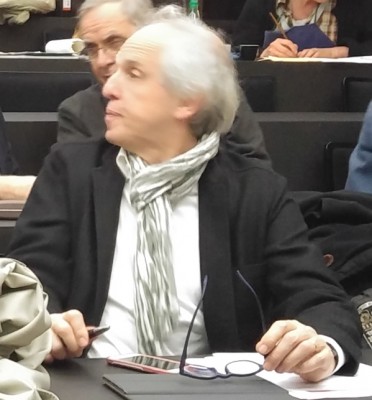
- Thus, it's important for the European Countries to create a Coherent Policy in Strategic, key areas, between them, he stressed, inter alia.
----------------------------------------------------------
+ Advancing "Beyond the Amounts of Funds, and Beyond Politics", from the pure point of view of Scientists, World-Famous NOBEL Prize Winner for Chemistry, Professor Jean-Marie Lehn, Director of Strasbourg's Institute on MacroMolecular structures, praised ECR's role particularly for his Support to a "Science withOut Borders", by Helping "Not Structures or Organisations" (which are also necessary), "but Individual Persons, who have certain Ideas", and need "Time" to Work on them, as well as the "Autonomy" that ECR's Funding gives them, as he characteristicaly said : F.ex., 3 or 4 Millions € during 5 Years is OK for such a "Culture of Projects", allowing them to be Developed, as never before, he observed.
-----------------------------------------------------
++ However, regrets were expressed, by the European Science Foundation's new Secretary General, Jean-Claude Worms, for the Interruption of the initial "Synergy" Programs, where EU Countries cooperated for the Funding of Trans-Border Networks of Scientists, on ambitious Pluri-Disciplinary Projects : Something which had worked, Back on 2012-2013, but does Not Exist Today, no more in Europe, (except, perhaps, of the COS Program in Brussels, etc).
- Nevertheless, ECR's President, Jean-Pierre Bourguignon, Announced, in Reply, that, after a Careful collective Evaluation of those "Synergy" Programs, which Concluded with quasi-Unanimous Positive apraisals, even, by those who previously were rather Critical, it has just been Decided that New European "Sunergy" projects will be Launched for 2018 and 2019, with 250 and 400 Millions €, respectively.
- A Challenge to face will be (in Addition to the Financial Amounts required) to succeed to Find really "Strong" Projects, Maximising the "Cocktail" of Competences contained in a Network of Scientists across Borders, and a fruitful Inter-Disciplinary approach (f.ex. between Human/Social Sciences, Life and Natural Sciences, etc), so that they can seriously Justify a considerable Funding which may be something about 6 to 16 Millions € during more than 6 Years, without Excessive Administrative Costs, (f.ex. +3%; as the Initial "Synergy" Networks had provoked in the Past : Comp. Supra), so that Accounts don't deprive Science from necessary Funds, as he Warned.
----------------------------------------------------------------------
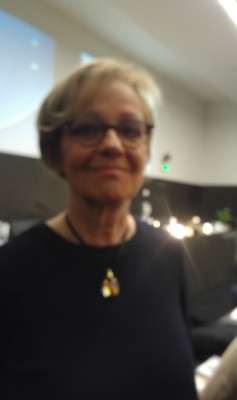
- An at least partially Similar Example, has already started at Strasbourg's University, with a Collective Project, which created a Trans-European Network, bringing Together Specialists in Law, Finance, Security, etc., in order to Fight Against International Organized Crime, mainly through a New Investigation System, which was set up, between 2009-2017, by Strasbourg Universiity's Professor Chantal Cutajar, (also the City's Deputy Mayor responsible for Citizens' Participation), with the Help of 90% European Funds, added to 10% Grants from Local/Regional Authorities, resulting also to PanEuropean Conferences, several Doctoral Thesis, etc, that she described, previously, Introducing a series of 5 Concrete Science/Research Projects realized here thanks to European Funding.
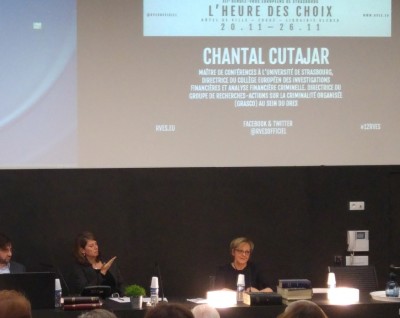
+ With an ERC Grant of 1,5 Million € during 5 Years (2012-2017), the Young German Scientist Wiebke Drenkhan, a Physicist, Researcher in Strasbourg's Bio-Tech. Institute "Sadron", who managed, on the Contrary, to Travel for Studies and Research, from Germany to France, the UK, Japan, New Zeland and USA, said that she Focused on "Cellular Materials" Shaped like "Foam", which, inter alia, might help in a Wide Area of Various eventual Applications, including, f.ex., to create "Walls which Capture Traffic Noise, but let Hear Birds Sing", as she symbolically joked.
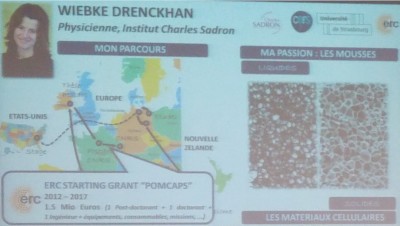
++ Professor at Strasbourg University's Labo for Optical and Digital Engineers, Sylvain Gioux, also used European Funding in order to Invent a New Tool Helping Surgeons to get a Better and Clear View of all the Area of a Patient's Body and Organs where they have to Operate.
+++ Last, but not least, Professor Anne-Sophie Korganow, also a Practicing Medical Doctor, organized, thanks to EU Funds, an original Data-Base with Genetic and Other Health Data from Patients located in the Franco-Germano-Swiss Euro-Region of Superior Rhine (OberRhine), concerning mainly Rare illnesses, named "RARE-NET". In Parallel, "Eurofora" was Glad to learn that she had also Succesfully Operated f.ex. a person that we know, Healing her from a thorny Health Problem in the Past, as she told us, with Gratitude.
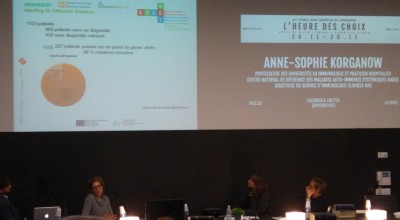
A fact which reminds that, sometimes, supporting Science, might Help to Find UnExpected Solutions also to very Differend Issues, Affecting People's Lives....
After all, didn't Medical Dr. Pasteur, notoriously, do something partly similar, when he UnExpectedly invented the Vaccines, in the Past ? And what about Physicist Newton and his Apple Tree ? Or Philosopher Eratosthenes and his Shadow under a Hot Sun, compared to the Earth ? Not to mention Inventor Archimedes and his Bath-Water...
-------------------------------------------------------------
Main Menu
Home Press Deontology/Ethics 2009 Innovation Year EU endorses EuroFora's idea Multi-Lingual FORUM Subscribers/Donors FAQs Advanced search EuroFora supports Seabird newsitems In Brief European Headquarters' MAPs CoE Journalists Protection PlatformBRIEF NEWS
- 00:00 - 02.06.2021
- 00:00 - 18.10.2020
- 00:00 - 19.06.2020
- 00:00 - 18.05.2020
- 00:00 - 20.04.2020
- 00:00 - 02.02.2020
- 00:00 - 09.12.2019
- 00:00 - 27.11.2019
- 00:00 - 16.11.2019
Popular
- Yes, we could have prevented Ferguson riots says World Democracy Forum's Young American NGO to ERFRA
- Spanish People Elect CenterRIGHT Majority with 1st Party and Total of 178 MPs (6 More than the Left)
- Pflimlin's vision
- The European Athletic "Dream Team", after Barcelona 2010 Sport Championship Results
- Source Conseil d'Europe à ERFRA: Debatre Liberté d'Opposants à Loi livrant Mariage+Enfants à Homos ?
- Head of BioEthics InterGroup, MEP Peter Liese : "Embryonic stem cell research reaching its END" !?
- Spain: Jailed Turkish Terror suspect with Explosive,Drones,Chechen accomplices stirs Merah+ Burgas ?
- UN Head Ban Ki Moon at CoE World Democracy Forum : - "Listen to the People !"
Latest News
- EUOmbudsmen Conference 2022: Digital Gaps affect People's Trust threaten EF Project on EU Future ?
- French Election : Black Out on Virus, but Obligation for Fake 'Vaccines" Challenged
- Both French Presidential Candidates point at "Humanism" in crucial times...
- France : Zemmour = Outsider may become Game Changer in Presidential + Parliamentary Elections 2022
- PACE President Cox skips Turkey Worst (Occupation) case compared to Russia (DeMilitarisation) query
Statistics
Visitors: 59602875Archive
Login Form
Other Menu
Pierre Pflimlin's visionary line : Honouring the Memory of the man who wanted to build Europe on the Mountains, based on Spirit !
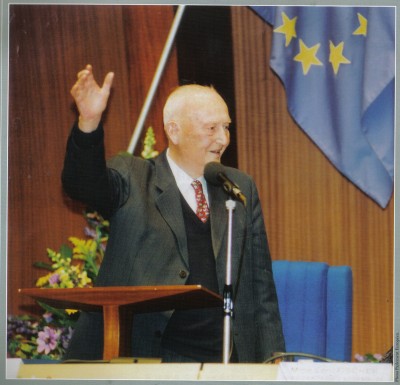
One of EuroFora's best inspirators is naturally Pierre Pflimlin :
We had a chance to personally meet the dynamic and experienced former President of both EU Parliament and CoE's Assembly, France's Prime Minister and Strasbourg's Mayor, only at his 90th anniversary, during an Historic speech at the Council of Europe, exceptionally full of people.
But his energetic figure looked more like a youngster of 19 years old, eager to win the Olympic games !..
Visionary, 2P was, from many points of view :
His daughter, Antoinette, Artist-decorator, and Senator Jung, President of a group of friends, confirmed us an Historian's revelation, that Pflimlin had initially the idea to build all European institutions (EU Parliament, Council of Europe, European Court of Human Rights, etc) at the spectacular heights of Oberhausbergen hills, with an eye-catching view of both French Vosges and German Black Forest Mountains, in the midst of a Forest : A real vision to create a brand New European Headquarters with a big ambition !
But, it seems, that "someone in Brussels" found that picture, precisely, too big for his taste, and threw a spanner on the works...
Pflimlin stroke back a Decade ago, at his Historic 1997 farewell speech :
He urged Europeans to find another, more substantial way, to lift Europe to more important Heights in Future :
- "On which basis can we imagine the birth of a great Europe ?", he asked.
"Certainly an Economic basis ! A solid market economy, meeting also the needs of social justice. A Political basis : Europe must become a strong Political Power, able to influence World's changes, naturally for Peace."
"But I believe that the essential foundation of a greater Europe should be of Spiritual nature : .... The great pacific Revolutions were Spiritual Victories" : They expressed "People's main motivation to live in a society with our Values of Liberty, Democracy, respect for Human Dignity".
"Then, the roadmap is ready : Yes, the foundation of the unity for a large Europe is the spiritual heritage, inspired by Christian Humanism and the Humanism of Renaissance, of Enlightenment, from which emerged a Civilisation focused on the Human person".
"Here is the task to be accomplished. It's very difficult".
"The Time approaches when I'll have to pass over the torchlight. God willing, this torch should enlighten the path of those who are going to build, tomorrow, the great Europe, marked by this Spirit".
(Extract from the Book "Pierre Pfilmin : Alsacian and European", 2007. Texts by Senator Louis Jung, by the long-time f. Director of Strasbourg's Newspaper DNA, Alain Howiller, and by f. EU Parliament's Press Director, Paul Collowald : See dedications, hand-written by the authors, the day the book for Pflimlin's 100th Aniversary was launched at Strasbourg's Press Club and European Parliamentary Association's headquarters, 13 April 2007).
